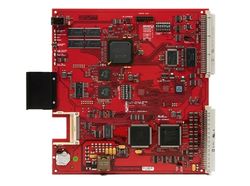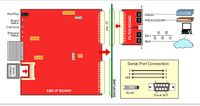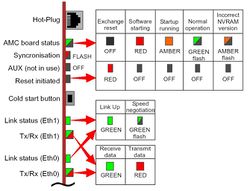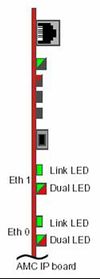AMC-IP - AlphaCom Processor Board (Red)
From Zenitel Wiki
The AMC IP card is the next generation multiservice card made for the STENTOFON AlphaCom E series. The card is made for critical communication and security solutions featuring an embedded real time Linux operating system, integrated media processing engine, packet processing engine, HW encryption and storage module.
The AMC IP card opens up for a new set of innovative services to improve cost efficiency, service capabilities and system operation.
A wide range of open interfaces allow extended integration with different kinds of communication and alarm systems, access control, CCTV, public address, public telephones and a variety of features and solutions that can be added when desired. It is easy to interface to 3rd party systems to create special applications.
The new technology allows remote programming, logging and maintenance via AlphaPro, Syslog and standard web browsers.
The integrated Web and SIP server extends the AlphaCom communication and security solution to external systems such as PDA, iPBXs, mobiles, and PCs.
Contents
Features
- Next generation multiservice card with integrated media processing engine, packet processing engine, HW encryption, and storage module
- Made for critical communication and safety solutions
- Embedded real time Linux operating system
- Best of both worlds – supports a mix of IP and traditional services
- Backward compatible
- SIP interoperability with external VoIP systems and equipment
- Wide range of open interfaces
- New services through Web, i.e. remote programming
- Networking capabilities to extend your solution geographically
Installation
The AMC-IP board can substitute the CPU card in existing AlphaCom 80+ and 138 exchanges, and is standard in the new AlphaCom E7, E20 and E26 exchanges.
In AlphaCom E20 and E26 exchanges the board plugs into board position 25, in the AlphaCom E7 it plugs into position 7.
The board can be inserted in a powered cabinet by connecting the power hot-plug cable to the board prior to insertion. The AMC status LED is red. Remove the plug when the board is in place. If a hot-plug cable is not available, the mains switch must be turned off.
Filter Board
A filter and connection board, FBIP, must be inserted from the rear side of the cabinet in the same card position as the AMC-IP card. This filter board is not needed in AlphaCom E7 where all EMC filters and external connectors are integrated in the backplane. A service PC must be connected to Eth0 (default) or to RS232 (Serial Port 0). The USB connector is not available in the 10.0 AMC-IP board versions.
Compability
The AMC IP card provides full backward compatibility in both software and hardware. All traditional AlphaCom services and interfaces are supported. The card can even support traditional AlphaCom feature card and cabinets, allowing STENTOFON AlphaCom 80+ and AlphaCom 138 to be upgraded with AlphaCom E features.
LED indicators
The card has a number of LEDs to indicate the board and Ethernet status.
Switches and jumpers
The AMC-IP board has two 8-bank DIP switches and four jumpers set to default position at delivery.
- Note! Do NOT change the default settings unless you are absolutely
sure of the consequences.
S200 settings
Technical Specification
| Dimensions (WxHxD)<br\> | 10x230x263mm <br\>Double Extended Europe Format |
| Central processor <br\><br\> | Intel IPX425, 400 MHz, XScale core <br\> 3 Network Processor Engines <br\> Hardware Encryption |
| Media processors <br\> DSP <br\> FPGA <br\> | <br\> TI TMS320C6205, 200 MHz, 1600 MIPS <br\> XILINX Spartan-3 <br\> 32 parallel audio streams |
| RAM, Workspace <br\> NVRAM (Battery) | 128 MB SDRAM <br\> 1 MB SRAM |
| Flash <br\> Program <br\> Optional | <br\> 32 MB StartaFlash <br\> Up to 4 GB Compact Flash
Note: the CF is currently not supported. |
| Operating system | Linux v. 2.4.20 |
| Serial ports <br\> RS232 only <br\> RS232 / 422 / 485 | <br\> Up to 115200 kbps <br\> Up to 115200 kbps |
| Ethernet ports (2 x) <br\><br\><br\><br\> | IEEE 802.3 <br\> 10/100 Mbps <br\> Half / Full Duplex <br\> Auto Negotiation <br\> Auto MDI/MDIX switch-over |
| IP protocols <br\><br\> | IP v4 - IP v6 - TCP - UDP - Telenet - FTP - NTP <br\> - HTTP 1.1 - Syslog - SNMP v2c - SIP - RTP - <br\> RTCP - VolP AlphaNet - STENTOFON data |
| Audio technology <br\><br\><br\> | High-Resolution 1-Bit Audio - High-Fidelity <br\> 40 Hz-18.5 kHz - Wideband 7kHz (G.722) <br\> - Narrowband 3.4 kHz (G.711) - Adaptive <br\> Jitter Buffers - Adaptive Time Synchronization |





